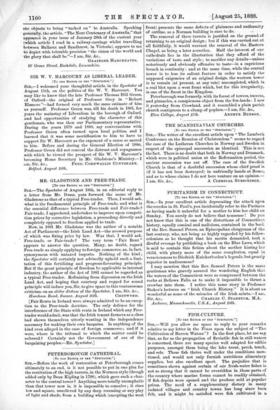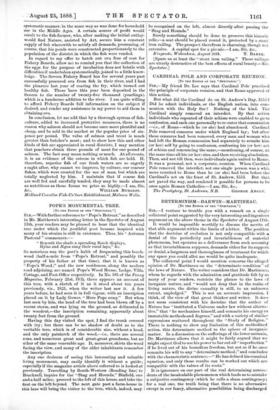FISH-CULTURE.
[TO THE EDITOR OF THE " STECTATOR.1 you allow me space to reply to your remarks relative to my letter in the Times upon the subject of "The Cultivation of Barren Waters" ? In the first place, let me say. that, as far as the propagation of fluviatile fish in still waters is concerned, there are many species well adapted for edible purposes, amongst them being the lake trout, perch, tench, and eels. These fish thrive well uncler the conditions men- tioned, and would not only furnish nutritious alimentary supplies, but also excellent sport. The prejudice that is. sometimes shown against certain of our fresh-water fishes is. not so strong that it cannot be overridden in _those parts of the country where marine forms cannot be readily obtained, if fish depots were opened and the produce sold at popular prices. The need of a supplementary dietary in many isolated villages and country towns has long since been felt, and it might be satisfied were fish cultivated in a.
systematic =lamer, in the same way as was done for household use in the Middle Ages. A certain source of profit would result to the fish-farmer, who, after making the initial outlay, would -find Nature, assisted by Art, secure him a constant supply of fish wherewith to satisfy all demands, presaming, of course, that his ponds were constructed proportionately to the population of the district in which the fish were vended.
In regard to my offer to hatch out ova free of cost for Fishery Boards, allow me to remind you that the collection of the eggs for the purpose of incubation does not bristle with difficulties if undertaken systematically, joined to a little know- ledge. The Severn Fishery Board has for several years past successfully procured ova from fish in their river, and I had the pleasure last year of rearing the fry, which turned out healthy fish. These have this year been deposited in the Severn to the number of twenty-five thousand (yearlings), which is a handsome addition to the river. I am quite willing to afford Fishery Boards full information on the subject if desired, and render any assistance in my power to aid them in obtaining ova.
In conclusion, let me add that by a thorough system of fish- culture, added to increased protective measures, there is no reason why salmon should not become once more plentiful and , cheap, and be sold in the market at the popular price of six- pence per pound. The value of salmon and trout is much • greater than butcher's meat; and to show how this and other kinds of fish are appreciated in rural districts, I may mention that poachers obtain three pounds of meat for one pound of salmon. The fact may mean nothing or much. At all events, it is an evidence of the esteem in which fish are held. If, therefore, superior fish of our fresh waters are so eagerly sought after, why cannot we improve, by culture, our coarser fishes, which were created for the use of man, but which are totally neglected by him. I maintain that if coarse fish are well fed and carefully tended, they may be made almost as nutritious as those forms we prize so highly.—I am, Sir,



































 Previous page
Previous page